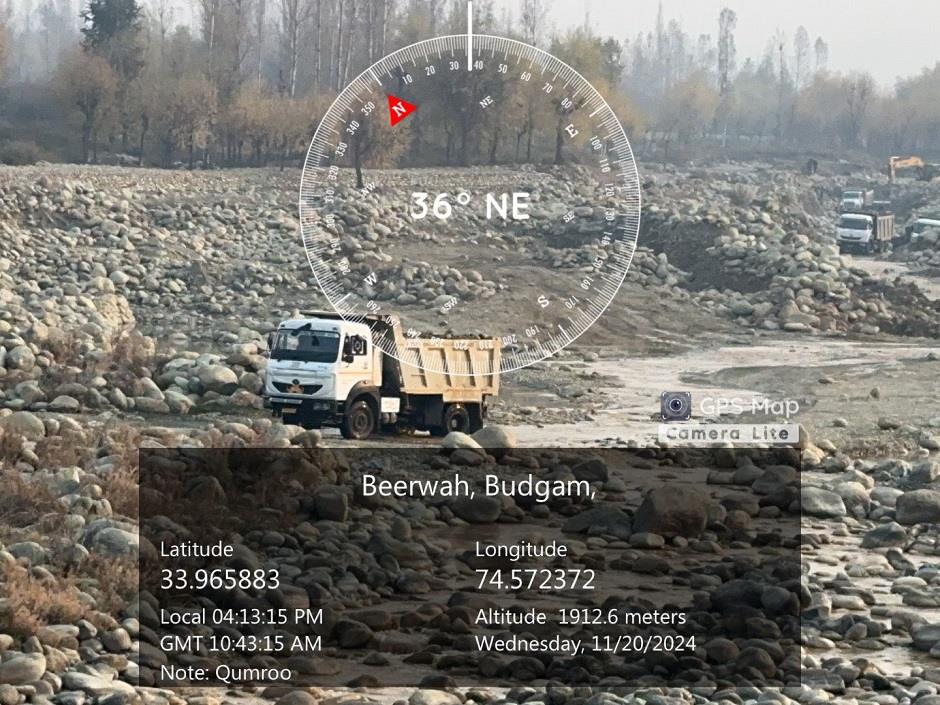How Illegal Mining Ignited A Fight To Save A Kashmiri River
How Illegal Mining Ignited a Fight to Save a Kashmiri River
Peerzada Rayees has spent years tending to his trout farm in Beerwah, relying entirely on the waters of the Sukhnag River.
On the night of May 23-24, 2024, his farm suffered a devastating blow. Illegal mining operations diverted the river, killing 2,000 trout weighing between 250 and 350 grams each.
The loss of nearly 600 kilograms of fish amounted to roughly three lakh rupees.
It was the loss of a life's work, the betrayal of a river the man depended on, and the stark reality of unchecked exploitation.
Rayees's story is a window into the broader destruction along Sukhnag.
Over the past three to four years, illegal mining has stripped the riverbed of boulders, diverted water, and damaged ecosystems. Crops suffered, fisheries collapsed, and communities across Sail, Qumiroo, Kangripora, Kunigund, and nearby areas faced economic and environmental insecurity.
Between 2022 and 2024, 163 short-term permits for boulder extraction were issued, often serving as cover for large-scale plundering. Compensation meant to repair the damage rarely reached the government treasury, leaving villagers to shoulder the consequences.
The case returned to the National Green Tribunal on September 24, 2025. Justice Prakash Shrivastava and expert member Dr. A. Senthil Vel approved a Joint Committee to supervise a five-member local team already assessing the river's damage. The local committee, led by the Sub Divisional Magistrate of Beerwah, includes officials from the Flood Spill Channel Division, Divisional Forest Office, Block Development Office, District Mineral Office, and Fisheries Department. Their task is to evaluate the impact of illegal mining, short-term permits, and other unauthorized activities on the river over the last few years.
Environmental lawyer Saurabh Sharma, who has represented the case for more than a year, highlighted evidence showing that even district officials facilitated some of the mining. Minutes from the District Level Single Window Committee reveal that the Deputy Commissioner of Budgam had at times directed clearance for boulder extraction.
The NGT recognized the need for impartial oversight. The Joint Committee, including representatives from the J&K Pollution Control Committee, the Ministry of Environment's Chandigarh office, and the GB Pant Institute, is empowered to supervise, verify, and ensure accountability without favouritism. The tribunal expects a report within ten weeks.
The government has acted in recent months. Since January 2024, authorities have seized 215 vehicles, lodged 26 FIRs, and collected nearly 30 lakh rupees in penalties. Mining under short-term permits has officially stopped. But these measures cannot erase years of damage or the losses suffered by fish farmers like Rayees.
For many villagers, the tribunal's intervention is the first real hope for justice and environmental restoration.
Sukhnag's plight illustrates a larger truth about Kashmir. Rivers sustain life, and when corruption intersects with natural resources, communities bear the consequences.
Human costs are immediate: lost income, disrupted livelihoods, and failed crops. Environmental costs are enduring: altered riverbeds, declining aquatic life, and destabilized ecosystems. Economic and ecological losses amplify each other, leaving villages trapped in cycles of destruction.

Legal Disclaimer:
MENAFN provides the
information “as is” without warranty of any kind. We do not accept
any responsibility or liability for the accuracy, content, images,
videos, licenses, completeness, legality, or reliability of the information
contained in this article. If you have any complaints or copyright
issues related to this article, kindly contact the provider above.
Most popular stories
Market Research

- Falconx Launches First Ethereum Staking Rate Forwards (Fras) Referencing Treehouse's TESR
- Ethereum Based Meme Coin Pepeto Presale Past $6.7 Million As Exchange Demo Launches
- Solstice Announces Strategic Collaboration With Chainlink And Leading Custody And Venture Firms To Enhance Ecosystem Ahead Of USX Stablecoin Launch
- Zebu Live 2025 Welcomes Coinbase, Solana, And Other Leaders Together For UK's Biggest Web3 Summit
- Falcon Finance Unveils $FF Governance Token In Updated Whitepaper
- Noveba Brings Apple Pay To Customers






















Comments
No comment